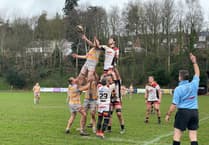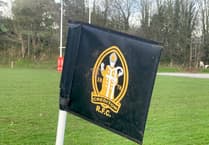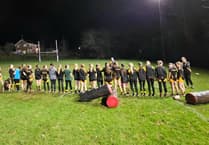IN April 1852, two young men from Crediton, namely George Burridge and William Pierce were hauled before the local magistrate for kicking a ball about in the public streets, much to the annoyance of local residents and tradespeople.
Burridge and Pearce got away with a caution and, were they to appear before him again, they would be severely punished. They were ordered to pay the costs of the hearing. Harsh times indeed.
Ten years later, in April 1862, complaints were made to the Magistrate that youths were playing football in the streets, again to the annoyance and on occasions, injury, of passers by. The Magistrate decreed that any future offenders be brought before the court.
In both instances, the game of football would have been purely some form of unruly kickabout with few, if any rules and whilst may have been great fun for the participants, certainly had the opposite effect on the townspeople.
Six years later and things looked to be a little more organised, maybe not as to how the game was played, but certainly in the context of one town challenging another.
In March 1868, the young men of Kingsnympton issued a challenge to the young men of Chulmleigh “to a game of football with them, to come off within a month and for any sum of money they will name”. The reporter at the time felt that the introduction of money into the contest would indeed take away the fun. Now there was a reporter way ahead of his time! Ultimately, the Challenge was declined.
Later that same year, an organised game did get off the ground when Blundell’s School present players took on their Past players. The game continued for almost two hours and honours were even with one score a piece.
Blundell’s School was probably the most influential establishment in Devon when it came to building the foundations for the game of rugby in the County. It still does have enormous influence in the game today.
And so we come to March 16, 1870 when it was reported that “a football match was played in a field near the railway station, between young Kirton and the Grammar School; the latter were double in number but were beaten by the town team by two scores to one”.
This was probably the first organised football match in Crediton and would undoubtedly have involved both handling and kicking the ball. Again, it was an educational establishment that provided the impetus for the introduction of the game within its locality.
It took a further six years for an official Club to be founded in the town, in October 1876 and apart from the odd blip, the much changed game of rugby has kept going ever since.
APRIL 12
Twenty years later and Crediton were Devon Champions and the County side was enjoying a wonderful period of reaching seven County Championship finals in 12 years, winning four.
However, success on the field for Crediton was not reflected in any more silverware until 1923-24 season when, after being runners-up the previous year, we actually won the Devon Junior Cup on April 12, 1924, defeating Salcombe 6-0 in the final, played at Teignmouth. Team Captain A.B. Gay scored a try and George Tuckett kicked a penalty.
The Competition was run on a regional league basis with Crediton playing in the North Devon area and, having won the group stage, set up a semi-final away at Tiverton which was won 3-0 courtesy of a try by Alan C.T. Blease.
Blease was an amazing athlete, having won most of the events at QEGS for the previous two years as well as winning a place at Cambridge University.
With the game reaching its conclusion and neither side having been able to score, it was a piece of brilliance from Blease who chipped over the top of the Tiverton defence and caught the ball to race in for a try. Crediton did not lack for support as 700 of the townspeople travelled for the game. Playing on the wing that day was Colin Burridge.
We made it to the final the following season but lost out to Newton Abbot Reserves 0-6 at the County Ground and again the name Burridge featured, this time Colin was joined by his younger brother Wallace on the other wing. Three consecutive finals and our first piece of silverware for 26 years, would it take another 26 years to find success?
Well no, not quite anyway as it was 22 years later that another final was reached and again played on the County Ground, this time the opponents were to be Buckfastleigh.
TIGHT AFFAIR
The 1946-47 final proved another tight affair and it was only in the last quarter of the game that Crediton scored, first through a try by the Captain A.B. Gay, who had been outstanding throughout the game. George Tuckett then landed a penalty to complete the scoring.
Post World War Two was a bit of a “bounce back” time for the Club after some fallow seasons of the late 1920’s to early 1930’s, the Club had begun to put some good seasons together but sadly World War Two interrupted that progress.
However, the Club was soon up and running after World War Two and that final on April 12, 1947, was the highlight of a remarkable season during which 21 of the 24 games were won.
Therein lies a coincidence as the 1923-24 Final was also played on April 12. The team was captained by scrum-half Ted Powlesland, a diminutive character full of tricks on the pitch and who went on to make in excess of 200 consecutive First Fifteen appearances, believed to be a Club record. Ted went on to become an outstanding referee and was a tremendous worker for the Devon Rugby Referees Society over many years.
LAST APPEARANCE
That was to be our last appearance in a Devon Senior or Junior Cup final, however there were more glory days ahead which will be left for a future edition.
The Burridge family may not have been represented in that final but Colin’s son Owen captained the Seconds in the 1950’s and grandson Trevor went on to play more than 500 games for the Club scoring more than 1,000 points.
In the meantime, returning to George Burridge and William Pierce, one wonders perhaps if they set out to annoy local residents or perhaps they were simply born too soon, who knows what sort of players they would have become had the game been on an organised footing for them.
For George Burridge in particular, he may well have had a huge influence on some of his descendants as throughout the history of Crediton RFC the Burridge name, along with many others, has been prominent. One final thought, the date of the court report for the two boys was, of course, April 12.
Paul Harris



